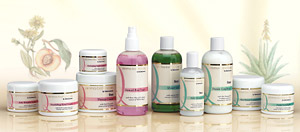How To Fight The Free Radicals That Destroy The Beauty Of Your Skin
 When cell damage occurs in the body it can lead to skin that looks much older than it really is.
When cell damage occurs in the body it can lead to skin that looks much older than it really is.
Not only that, but cell damage can also cause problems for the whole body when compounds known as free radicals attack your body’s cells both internally and externally.
Following an attack by free radicals, cells are damaged and an unstoppable chain-reaction begins within the membrane of the cells. The results of this reaction is called ‘oxidative stress’ which damages cells and can not only lead to wrinkled, dry, lifeless skin, but it may lead to illness, or in the worst case it can lead to cancer.
You are exposed to free radicals from a variety of external environmental sources, such as cigarette smoke, air pollution, and even sunlight. To combat the continual attack from these environmental aggressors, the body’s defence system uses antioxidants to fight the damage caused by these free radicals. This helps you maintain soft and supple, younger looking skin – whereas if the free radicals win the battle you can end up with skin that has aged prematurely. And it can be very difficult, if not impossible, to repair this type of skin damage.
The science bit
Free radicals lack a full complement of electrons, so they steal electrons from other molecules in the body, and this causes damage to those molecules during this process. Antioxidants are able to neutralize free radicals by giving up some of their own electrons, and by making this sacrifice they actually switch off the free radicals. By doing so they break the chain reaction which stops any damage spreading further along to other cells in the body.
To help your body continually fight the effects of free radicals you need a regular supply of antioxidants. The body naturally produces some powerful antioxidants such as alpha lipoic acid and glutathione, and some of the foods you eat provides others that your body can’t produce naturally.
I’ve said this before in articles many times, but to have truly beautiful, radiant skin it’s not enough to just use good quality skin care products – you must look after your internal health as well. Never overlook the importance of antioxidants in your diet because after the age of 30 the body does not produce as many antioxidants as it does when we are younger.
Superfoods, vitamins and minerals
Diets high in vegetables and fruits provide good sources of antioxidants to help your body in its quest to fight off the signs of aging. Blueberries, green tea, brown rice, dark chocolate, pomegranates, legumes and dark leafy green vegetables are all considered antioxidant-rich superfoods that should be included in a healthy diet, especially if you want to really look after your skin. Vitamins such as C and E as well as minerals including copper, zinc, and selenium all help to fight free radicals and help keep your skin in excellent condition.
Not only can vitamin E help protect your skin, but it can also work to repair the damage that’s already been caused. Vitamin E is a fat soluble vitamin and it can be found in many different foods, but peanuts, almonds and hazelnuts contain particularly high levels of it, as do sunflower and pumpkin seeds. Soybeans, olives, spinach, broccoli and slices of red bell peppers all add more of this important vitamin to your meals.
Breakfast cereals can also help you increase the levels of vitamin E in your diet. Look for cereals like bran flakes, multi-grain or oat cereal. Wheat germ is high in vitamin E and can be added to recipes without changing the flavour of the recipe, plus it doesn’t lose its antioxidant properties when heated. Although it’s an acquired taste, don’t forget that green tea fights free radicals effectively too, and the Chinese and Japanese cultures have always believed that a regular intake of green tea means a longer, healthier life. Modern research has proven this to be true time and time again.
Fight free radicals with botanicals
The use of botanical extracts as antioxidants has been gaining popularity over recent years, with many leading high street brands cashing in on the pioneering teachings first established by early aromatherapy companies in the UK and France. Many aromatherapy principals that we were taught back in the 1980’s did not have any evidence to support their credibility, with medical practitioners and researchers alike rolling their eyes and tut-tutting at the mention of aromatherapy. Not any longer.
Among the vast range of research conducted into the therapeutic properties of essential oils, many other discoveries have been made along the way. Studies have proven that there are several natural botanicals used in aromatherapy that can help protect you from the devastating effects of free radicals, including aloe vera gel, black seed, rosehip, argan, sunflower and safflower vegetable carrier oils.
The advantage of these natural antioxidants is that they can all be safely applied to the skin undiluted, or incorporated in skin care products in various combinations to provide a wide range of benefits to skin. For example, argan oil is packed full of powerful antioxidant compounds such as caffeic acid, vanillic acid, ferulic acid, resorcinol and catechin that protect and nourish skin.
Aloe vera in particular shows great antioxidant properties due to the presence of the polyphenols, indoles, and alkaloids, according to research confirmed by using oxygen radical absorption capacity (ORAC) and ferric reducing antioxidant capacity (FRAP) methods. Investigations of the antioxidant potential of a polysaccharide in aloe vera gel revealed it had a protective effect against dihydrochloride induced oxidative stress and cell’s death in kidney epithelial cells. Aloe vera also contains vitamins A, C and E, which are all antioxidants.
Rosehip oil contains copious amounts antioxidants which work to combat the signs of skin aging and environmental damage, such as over-exposure to the sun. This amazing oil is contains around 80% essential fatty acids including Omega 6 & 9 which nourish and plump up dehydrated skin while increasing the elasticity of skin. Rosehip oil also contains Lycopene which is a very powerful antioxidant & anti-inflammatory which protects skin from environmental toxins.
Work on the inside and outside
Hopefully by now you’ve got the point of this article; to have beautifully radiant skin you need to do more than just apply skin creams and the occasional facial mask. But when you do include free radical fighting antioxidants in your diet as well as using good quality skincare products containing organic essential oils and botanicals, you will stand the best chance ever of keeping your precious skin healthy and protected from the ravages of the environment.
When buying skin creams that claim to combat free radicals, be sure to look for those that not only contain vitamin E, but also the active botanical extracts and the vegetable oils discussed in this article. Chances are good that you already have some of the carrier oils in your collection, so you can start using these right away to protect your skin from free raducals.
If you have difficulty finding ready-made skin care products that meet this criteria check out our award-winning Vitamin E Cream containing organic Aloe Vera, Safflower oil and the finest Neroli essential oil from Tunisia. This highly versatile cream can be used any time of day and is suitable for all skin types, particularly dry and mature. Including Tunisian neroli essential oil neroli means this cream helps improve elasticity, stimulates new cell growth, reduces thread veins, softens wrinkles and scars, and smells absolutely divine too!
Copyright © Quinessence Aromatherapy Ltd 2020. Written by Sue Charles

































